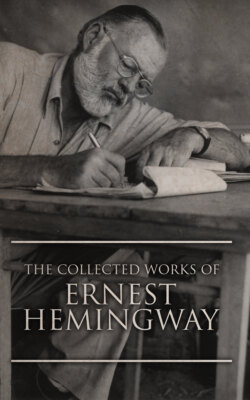Читать книгу The Collected Works of Ernest Hemingway - Ernest Hemingway - Страница 8
На сайте Литреса книга снята с продажи.
CHAPTER TWO
ОглавлениеTable of Contents
Scripps O’Neil stood outside the Mancelona High School looking up at the lighted windows. It was dark and the snow was falling. It had been falling ever since Scripps could remember. A passer-by stopped and stared at Scripps. After all, what was this man to him? He went on.
Scripps stood in the snow and stared up at the lighted windows of the High School. Inside there people were learning things. Far into the night they worked, the boys vying with the girls in their search for knowledge, this urge for the learning of things that was sweeping America. His girl, little Lousy, a girl that had cost him a cool seventy-five dollars in doctors’ bills, was in there learning. Scripps was proud. It was too late for him to learn, but there, day after day and night after night, Lousy was learning. She had the stuff in her, that girl.
Scripps went on up to his house. It was not a big house, but it wasn’t size that mattered to Scripps’s old woman.
“Scripps,” she often said when they were drinking together, “I don’t want a palace. All I want is a place to keep the wind out.” Scripps had taken her at her word. Now, as he walked in the late evening through the snow and saw the lights of his own home, he felt glad that he had taken her at her word. It was better this way than if he were coming home to a palace. He, Scripps, was not the sort of chap that wanted a palace.
He opened the door of his house and went in. Something kept going through his head. He tried to get it out, but it was no good. What was it that poet chap his friend Harry Parker had met once in Detroit had written? Harry used to recite it: “Through pleasures and palaces though I may roam. When you something something something there’s no place like home.” He could not remember the words. Not all of them. He had written a simple tune to it and taught Lucy to sing it. That was when they first were married. Scripps might have been a composer, one of these chaps that write the stuff the Chicago Symphony Orchestra plays, if he had had a chance to go on. He would get Lucy to sing that song tonight. He would never drink again. Drinking robbed him of his ear for music. Times when he was drunk the sound of the whistles of the trains at night pulling up the Boyne Falls grade seemed more lovely than anything this chap Stravinsky had ever written. Drinking had done that. It was wrong. He would get away to Paris. Like this chap Albert Spalding that played the violin.
Scripps opened the door. He went in. “Lucy,” he called, “it is I, Scripps.” He would never drink again. No more nights out on the railroad. Perhaps Lucy needed a new fur coat. Perhaps, after all, she had wanted a palace instead of this place. You never knew how you were treating a woman. Perhaps, after all, this place was not keeping out the wind. Fantastic. He lit a match. “Lucy!” he called, and there was a note of dumb terror in his mouth. His friend Walt Simmons had heard just such a cry from a stallion that had once been run over by a passing autobus in the Place Vendôme in Paris. In Paris there were no geldings. All the horses were stallions. They did not breed mares. Not since the war. The war changed all that.
“Lucy!” he called, and again “Lucy!” There was no answer. The house was empty. Through the snow-filled air, as he stood there alone in his tall leanness, in his own deserted house, there came to Scripps’s ears the distant sound of an Indian war-whoop.
